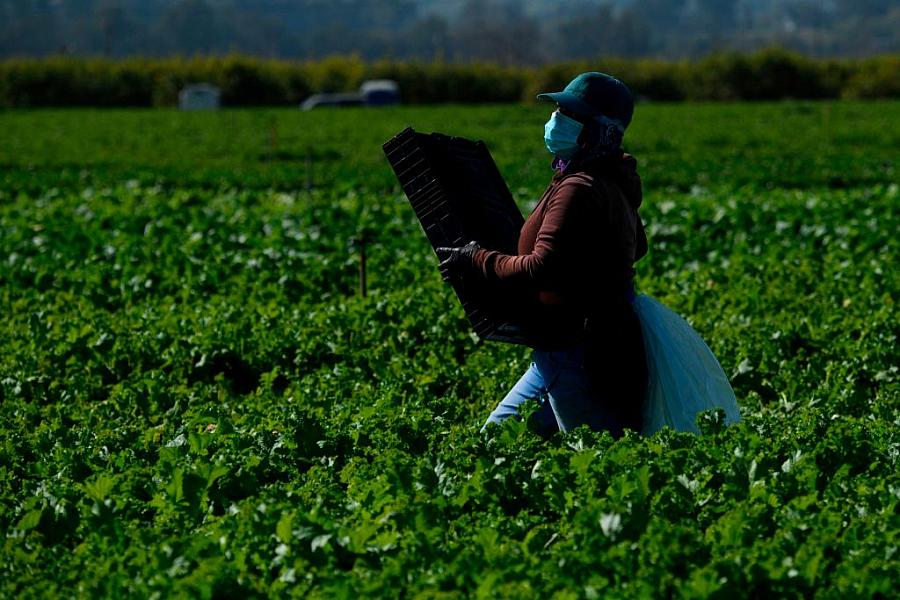Elevating voices not often heard in mainstream media

(Photo by Patrick T. Fallon/AFP via Getty Images)
The COVID pandemic has taken a devastating toll among Indigenous migrant farmworkers in California. These migrants — who speak ancient languages like Mixtec, unrelated to Spanish — are isolated and have struggled to sort through waves of misinformation. Many doubted the virus was a real threat at first. And public health officials often left them out of the equation. Combined with crowded housing and low access to health care, they were left particularly vulnerable to infection, serious illness and death.
Arcenio López, a former farmworker who leads the Mixteco/Indígena Community Organizing Project (MICOP) in Oxnard, knows this better than most. His organization is one of the most trusted advocates for the Indigenous migrant community on California’s Central Coast. Early in the pandemic, he sought to raise awareness about unmet needs in his community.
Journalism, he decided, could be the key to raising the profile and needs of his community amid a historic crisis. Rather than rely on outsiders to tell that story, he decided to take on the challenge himself, with the support of a Center for Health Journalism initiative to involve nontraditional storytellers into our journalism training programs.
López, who took part in the 2021 California Fellowship, wrote op-eds in English for the Los Angeles Times and the Fresno Bee, and in Spanish for Telemundo, all calling attention to the health issues facing the community.
“It took me out of my comfort zone,” López said. “But as a community leader, I felt a sense of responsibility to try a different approach to make our voices be heard. My intention was to reach a broader audience that probably didn’t know anything about the challenges and struggles of Indigenous migrant farmworkers.”
López has been advocating for his community ever since he came to work in the strawberry fields of Ventura County 20 years ago, hoping to make enough money to support his family in Oaxaca. Seeing how workers were mistreated, he began volunteering for MICOP as a community organizer. A decade later, López was appointed to lead the organization, its first Indigenous executive director.
“My goal was to amplify the stories shared by farmworkers in their own words, relaying their perspectives regarding misinformation during the pandemic,” he said. “I wanted to elevate and visualize the unjust experiences of the Indigenous migrant community whose voices are not often heard or represented in the news media.” Arcenio López, Fellow
The organization has thrived under his leadership, earning a 2021 California Nonprofit of the Year award from the state of California. It has expanded its services and grown geographically. Now, through the training he received during his fellowship, López sees journalism as another tool to advocate for his community.
“My goal was to amplify the stories shared by farmworkers in their own words, relaying their perspectives regarding misinformation during the pandemic,” he said. “I wanted to elevate and visualize the unjust experiences of the Indigenous migrant community whose voices are not often heard or represented in the news media.”
In his op-ed for the LA Times, López wrote about how the lack of public health information in Indigenous languages had “put our community in a state of chronic vulnerability and isolation.” He told the story of a widow who lost her job in the fields and was racked by debts after contracting COVID. “It does exist, it happened to me, I could not speak for 25 days, I could not eat, I could not drink water,” she told López.
In his op-eds for the Fresno Bee and Telemundo, López described how high rates of diabetes and other chronic diseases among Indigenous migrant farmworkers had made them more vulnerable to complications from the virus. These were stories and perspectives that weren’t otherwise surfacing in state and national coverage.
López says he struggled with the writing process — English is his third language, after Mixtec and Spanish. But the training, encouragement and support he received during the fellowship helped him reach his goal. Knowing that he was uniquely qualified to faithfully represent the perspectives of his community, he said, was a major motivator.
“The process was not easy — creating a piece with the purpose of raising awareness of the system of injustice was always my intention,” he said. “At one point, I was on the verge of giving up because I couldn’t find a media outlet to publish my work, but the team at the Center for Health Journalism was instrumental in helping get these stories out.”
“The Center is a platform for voices — especially those historically underrepresented voices — to get the technical, emotional, and professional support to tell their stories in their own voices, from their own experiences,” López said. “This has more impact and potential to create systemic changes for a more inclusive California.”
